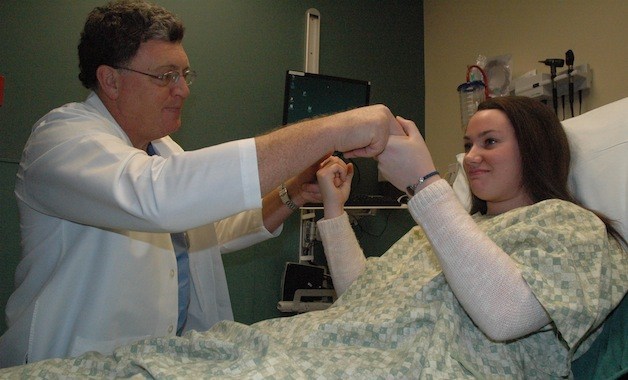ARLINGTON — When Grace Meno suffered a concussion playing volleyball on Sept. 11, 2012, the Arlington High School freshman had to take a year off to recuperate.
While she’s still coping with the side effects of the injury, Meno not only returned to school full-time in September in 2013, but she’s since taken up the cause of promoting concussion awareness.
After Grace tripped while running, and landed on her head and her hip, she was sent first to Cascade Valley Hospital, then to Seattle Children’s Hospital for three days.
“I didn’t connect what had happened to a traumatic brain injury at first,” said Kimberly Meno, Grace’s mom.
Grace nonetheless returned to the Harborview Medical Center ER in Seattle the following night because of a seizure.
“I had to relearn how to read, write, talk, eat and take a shower, all things I took for granted,” Grace Meno said. “I had speech therapy three times a week for four months. I walked with a cane until I was able to use Abby, my medical alert service dog, and physical therapy to get my balance back.”
While Grace and Kimberly Meno were effusive in their praise for the Arlington School District, especially in its accommodations of Abby, a 7-year-old black Labrador Retriever, Grace still faces a road to recovery that, on some fronts, could last a lifetime.
“I used to be really outgoing, but now I have anxiety disorders,” said Grace Meno, who continues to suffer headaches 24/7, and seizures as often as two to three times a month. “My friends all wanted to help, but they didn’t know how to react. And now, 18 months later, I’m mostly back to normal physically, but I’m nowhere near normal cognitively, mentally or emotionally.”
Six weeks after her concussion, Grace Meno was able to attend one of her classes. By the semester break, she was capable of attending three classes. After resuming a full class schedule at the start of this school year, she got the idea to start selling concussion awareness wristbands.
“I didn’t think anybody would be interested in them,” Kimberly Meno said.
Four months later, Kimberly is more than happy to be proven wrong, as Grace has used word-of-mouth and social media to sell more than 300 “Heads Up!” concussion awareness wristbands, in more than 10 states, raising approximately $1,200 for the Brain Injury Association of America in the process.
“My goal is to raise a total of $2,000 for research on concussions and brain injuries,” said Grace Meno, who added that 100 percent of the proceeds from the wristband sales goes directly to the Brain Injury Association of America. “At the end of the day, my main goal is to bring awareness to our communities about the seriousness of brain injuries.”
Grace has seen numerous doctors in addition to her primary care physician, including the staff of Cascade Valley Hospital, where she received an MRI.
“Girls’ volleyball and soccer result in the most concussions of any sport,” said Jennifer Egger, community relations coordinator for Cascade Valley Hospital. “They don’t wear helmets, and they’re more aggressive than girls’ sports used to be. The state of protective gear in those sports needs to change.”
In the meantime, Egger recommended that coaches use concussion pre-screenings, to help detect evidence of traumatic brain injuries on the field.
“If the athletes’ answers don’t match what they gave before the game, that can be a sign,” Egger said. “Kids will want to continue playing, but coaches and parents shouldn’t be afraid to pull them out if they give even the smallest signs of being concussed, especially since one concussion can lead more frequently to other injuries, including a second concussion.”
AHS Athletic Director Tom Roys reported that all of the school district’s athletes are now subject to such pre-screenings.
“It’s a 40-minute computer test that evaluates their regular cognitive ability, when they’re not concussed, and then compares that to their answers when there’s a suspicion of concussion,” Roys said. “It’s one of the tools we use to evaluate whether an athlete should return to play.”
According to Roys, this pre-screening procedure was implemented just within the last school year.
“Grace’s situation made it real for us,” Roys said.
Those who wish to support Grace Meno’s “Heads Up!” concussion awareness can log onto her fundraising website at www.youcaring.com/other/head-s-up-/144032 and email her at gracemeno11@hotmail.com.
“After you’ve donated, please email me your address, and I will put a concussion awareness wristband in the mail to you ASAP,” Grace Meno said. “The suggested donation is $1 each, but you can feel free to give more. I’ve had donations of as much as $200.”
Donors should also specify the number of wristbands they wish to receive. All donations are tax deductible, and the Brain Injury Association of America’s tax ID number is 04-2716222.







